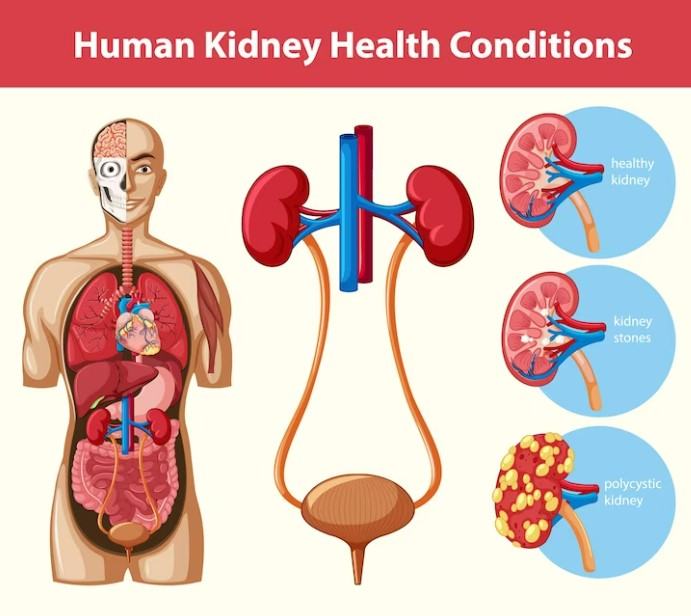
Kidneys perform many critical functions in our bodies, such as eliminating waste materials and excess water in the form of urine. They also help with blood pressure control, bone health, and the production of red blood cells. Acute renal damage or disease is defined as kidney disease that lasts less than three months. Chronic renal disease is defined as being present for longer than three months. Even if the kidneys fully recover from an acute kidney injury, it can have long-term health implications.
In this article, we will discuss Kidney related issues, diagnoses, treatments and important tips for kidney health.

Kidney disease is a serious public health issue. Kidney disease frequently goes unnoticed until it is advanced. Unfortunately, this is the point at which someone would require dialysis or a transplant. The idea is to diagnose the cause of any kidney problem before it causes other problems. Regular testing is necessary for everyone, but it is especially vital for individuals who are at risk.
Risk Factors for Kidney Diseases
Some major risk factors for kidney disease include:
-
Diabetes
-
Hypertension
-
Kidney stones
-
Infections (urinary tract or systemic)
-
Overweight and obesity
-
Use of over-the-counter painkillers
-
Any prior acute kidney injury
-
Any family history of kidney disease
-
Very low body weight at the time of birth.
Diagnosis of kidney disease:
-
Complete Urine Examination
Protein, blood, and other abnormal elements will be diagnosed in urine. Normally, urine contains relatively little protein. In the right clinical context, any increase in protein in the urine will indicate the existence of kidney disease. The presence of red blood cells in urine indicates the existence of kidney disease, which requires further testing to confirm.
-
Blood Test to Detect Kidney Diseases
Blood will be tested for urea and creatinine levels, which are increased in the presence of kidney disease. In the clinic, creatinine levels are used to calculate GFR.
-
Ultrasound
It will help in determining the number, location, size, and appearance of kidneys. It also helps in the evaluation of the ureters, bladder, and the presence of urinary tract stones. Chronic renal disease patients may have tiny, deformed, or blocked kidneys.
Tips for Healthy Kidneys
Keeping the kidneys healthy is not a difficult chore. Individuals can keep their kidneys healthy in a variety of ways, including:
-
Exercising Regularly
Staying physically active offers more than just weight management benefits; it also improves overall health. Regular exercise, even in moderate forms like running, cycling, or dancing, can significantly lower blood pressure, enhance heart health, and play a crucial role in preventing kidney damage. Engaging in activities as desired may maximise the positive effects on the kidneys.
-
Making it a Habit to Drink Plenty of Water
Maintaining a regular intake of water is beneficial for kidney health; aim for approximately eight glasses per day. Water helps in the elimination of sodium and toxins from the kidneys, reducing the chances of kidney disease. The specific amount of water needed may vary based on factors such as overall health, climate, gender, and existing health conditions. Individuals with a history of kidney stones are advised to consume slightly more water to minimise the formation of future stone deposits.
-
Quitting Smoking
Smoking blocks the blood flow in the kidneys by damaging or obstructing blood vessels. This harmful habit increases the chances of developing renal cell carcinoma, a form of kidney cancer. However, the risk of RCC decreases significantly upon quitting smoking.
-
Having a Kidney Diagnosis regularly
Individuals at high risk of kidney disease include diabetics, individuals with low birth weight, those with cardiovascular problems, high blood pressure, obesity, or a family history of kidney disease. These individuals must undergo regular kidney testing to monitor their potential risk.
-
Reducing the intake of OTC pills
It is recommended to only take medication as prescribed by the doctor, as taking it without proper recommendation can increase the risk of kidney disease. Over-the-counter pain relievers such as ibuprofen and naproxen can be harmful to the kidneys, so individuals should consult their doctor before choosing kidney-safe treatments for any pain they may be experiencing.
-
Avoiding the intake of carbonated soft drinks.
-
Other medications, toxins, insecticides, and illegal narcotics (including heroin and cocaine) can potentially harm the kidneys.
-
Maintaining the blood pressure within the normal range.
-
Maintaining the optimal cholesterol level.
-
Intake of foods that are low in sodium content.
-
Consumption of more fruits and vegetables.
-
Maintaining the body weight at an appropriate target range.
-
Limiting alcohol consumption: Excessive alcohol drinking may increase blood pressure and add calories to the diet.
-
Getting enough sleep.
Managing Risk Factors for Kidney Disease
People who are at high risk of developing kidney disease should do the following to avoid developing it:
-
Diabetes
A growing number of kidney patients have diabetes. Patients should meet blood sugar goals while checking their HbA1c level to determine their average sugar control over the last three months.
-
Hypertension
Patients should take regular blood pressure medications to keep their blood pressure in check. Uncontrolled high blood pressure can increase the progression of any underlying kidney disease. A low-salt diet with more fruits and vegetables is recommended.
-
Obesity and Overweight
Lose weight with regular physical activity.
-
It is recommended to take non-prescription drugs with extreme caution, especially pain relievers.
-
Other problems such as kidney stone disease, autoimmune disease, recurrent urine infections, and so on are also managed.
-
Regular blood and urine tests, as well as ultrasound examinations, are used to monitor kidney function.
In case of any emergency, please consult the top nephrologists in Vijayawada and get a full checkup and care.



















 4 Min Read
4 Min Read








.png)





